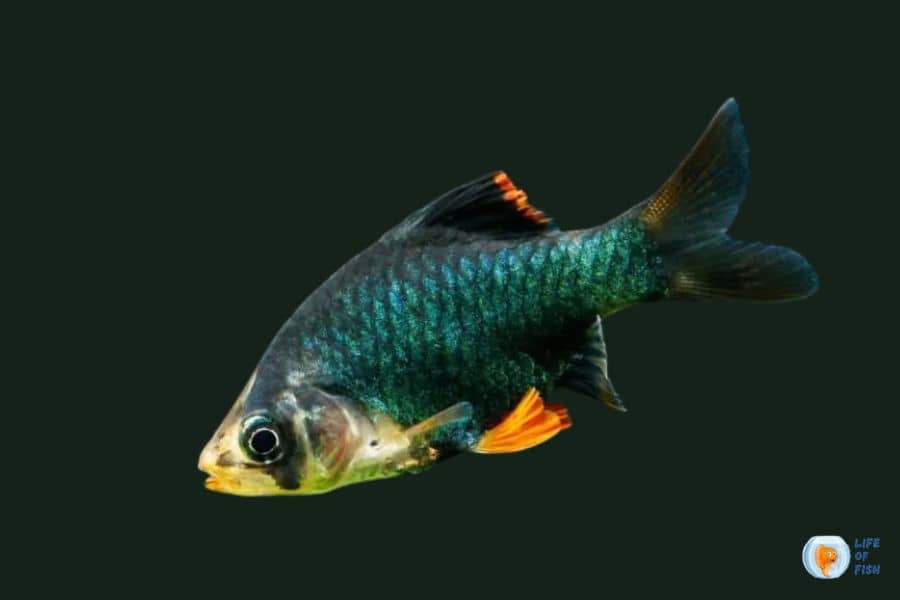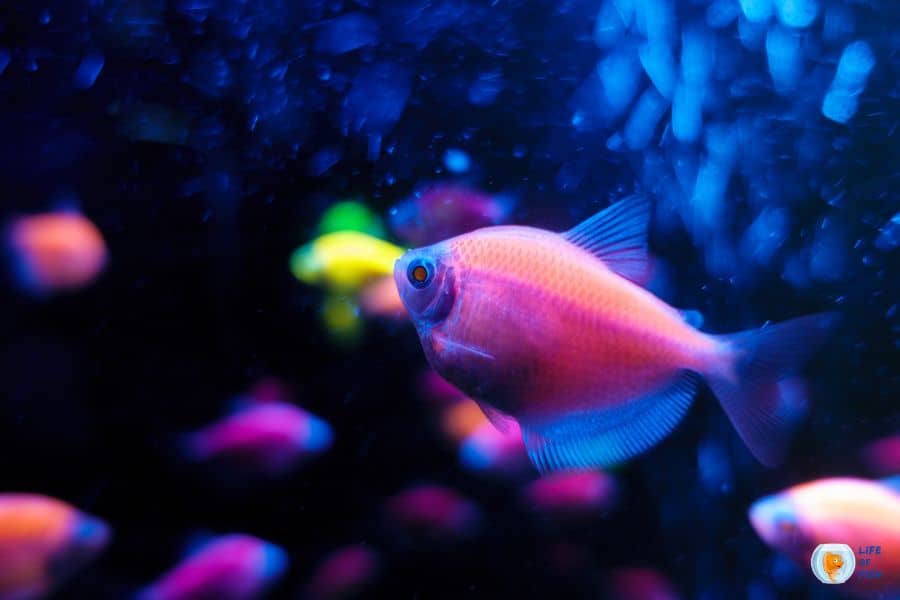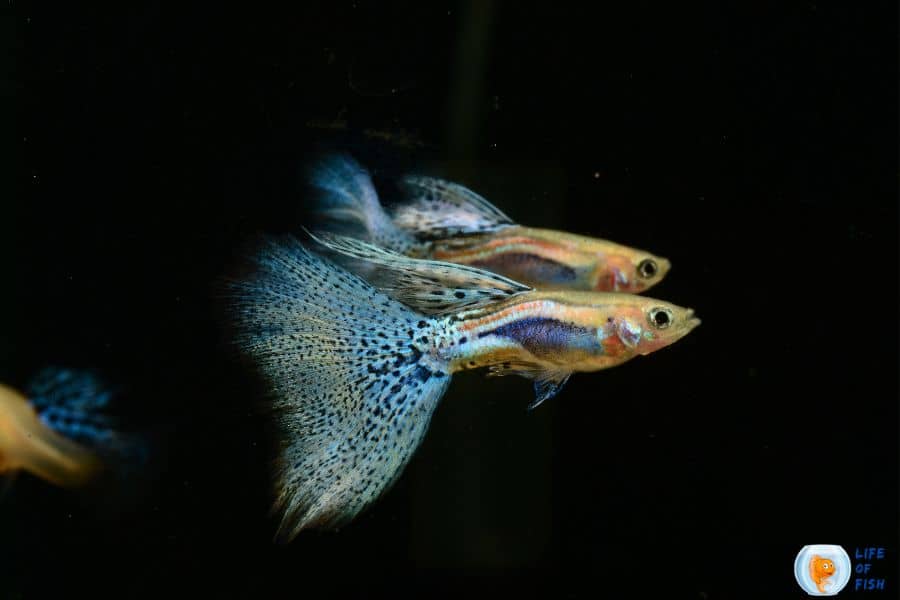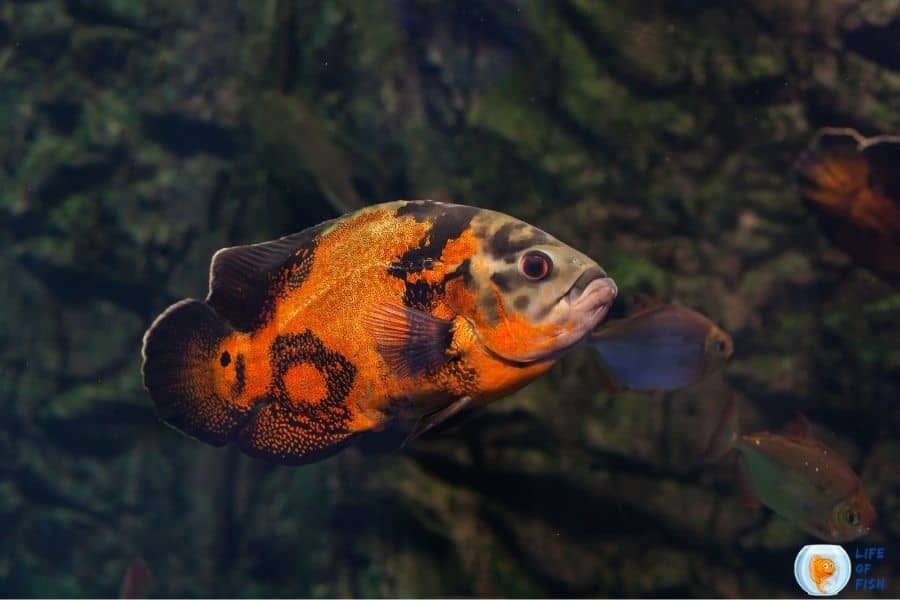If you are a beginner aquarist, you may have many questions concerning fish and their behavior. One of the most common questions many ask is how aquarium fish get around in the dark. Can they see when it’s pitch black? Fish who live in the sea could be different in characteristics from aquarium fish. The sea can be separated into different parts depending on how much light each part gets.
For example, the top of the sea gets more light than the bottom, so it’s natural to expect deep sea fish to be able to swim in the dark. However, the question is, ‘can aquarium fish see in the dark?’The answer might surprise you, so read on to find out.

Can Aquarium Fish See In The Dark?
Jump To
- 1 Can Aquarium Fish See In The Dark?
- 2 Do Aquarium Fish Need Darkness?
- 3 What Do Aquarium Fish Do In The Dark?
- 4 Do Aquarium Fish Sleep At Night Or During The Day?
- 5 Can You Leave The Lights On In A Fishing Tank
- 6 Are Fish Scared Of The Dark?
- 7 How Do Fish See Underwater At Night?
- 8 Do All Fish Have Night Vision?
- 9 Which Aquarium Fish Are Active At Night?
- 10 Conclusion
- 11 Frequently Asked Questions
Aquarium fish don’t see in the dark. They don’t use their eyes to see what is around them when pitch black. However, they can accustom themselves to the surroundings the same way bats do.
Bats use sound waves to identify their surroundings and move around. Aquarium fish interpret water waves similarly, making it easy for them to swim around even if it is pitch black.
Do Aquarium Fish Need Darkness?
Now that it is confirmed that aquarium fish don’t see in the dark, the next question is if they need darkness. Fish need both periods of darkness and light, similar to humans. They need periods of rest to regain their energy after a tiring day of swimming in search of food and mates.
According to IPets, all types of animals, including fish, need to give their bodies a break to find the energy to go about their activities the following day. The darkness helps fish go to sleep and gives them the much-needed rest they require to get themselves back to normal the following day. Once it’s dark, aquarium fish will find a quiet spot within the decorations and sleep.
What Do Aquarium Fish Do In The Dark?
Aquarium fish don’t find it an issue to adjust to the dark. Most types of fish, including cory catfish, sleep when it’s dark. However, fish such as bristlenose pleco are active at night. Therefore, you can use the period of darkness to feed them. Fish do pretty well in the dark as they don’t rely on their eyesight to move around. They use the pressure changes in the water to find food, shelter, and swim around.
While nocturnal fish species may swim around in the dark, other species will take this as a sign for them to take some rest. So, they will sleep once it’s dark in the aquarium.

Do Aquarium Fish Sleep At Night Or During The Day?
Fish typically sleep at night. However, some species are active at night. Even fish that sleep at night need to take naps a couple of times during the day. Fish don’t have eyelids. What they do is, enter a trance state and shut most of their body off. Fish usually don’t need to sleep all night long. They sleep as much as they need to and wake up once they are full of energy. A fish that is asleep will have slow body movement. Fish still need oxygen to get through their gills, which are always moving.
Can You Leave The Lights On In A Fishing Tank
Fish generally feel a natural day-and-night cycle throughout the day. Even active fish, during the night, are used to the two cycles of the day. So, although you keep fish in the darkness, you should ensure the lights are switched on for approximately 12 hours.
You need to switch off the lights after that and continue doing this daily so that the fish consistently maintain a healthy cycle. The best thing is to keep track of the natural cycle and simulate it inside the aquarium. Therefore, aquarium lights are not only there for aesthetic purposes. They are essential for fish, and you need to use them wisely in your tank.
Are Fish Scared Of The Dark?
Fish are not scared of the dark. Different fish have various habitats and requirements. Aquarium fish experience both light and dark, while deep sea fish experience only darkness for most of their lives.
However, fish could get startled when you switch on the aquarium lights after a long period of darkness. The same occurs when you switch off the lights after staying in the brightness. Therefore, it’s essential to have a dim light during the transition. Switch on the dim light and keep it for 30 minutes until you completely switch off all lights. Do the same vice versa. This transition helps keep fish from getting startled when moving from darkness to light or the other way.

How Do Fish See Underwater At Night?
Fish can navigate the dark waters by sensing their surroundings rather than seeing. Their sensory organs, known as lateral lines, assist them in detecting objects around them by sensing pressure changes in the water. The lateral lines are situated along the side of the fish’s body. They help fish detect movements in low light conditions and pitch blackness too.
Specific fish species, including sharks and electric eels, can sense and identify movements via electric fields generated by animals. Lateral lines help fish detect movement and move in the dark and navigate muddy waters.
How Do Fish Find Food In The Dark?
The lateral sensory organs in fish indicate changes in water pressure and help them swim and find food in the dark. These organs also help them move as they help detect objects ahead of them. The sensory organs detect vibrations in the surrounding, indicating fish that a predator or prey is approaching. Nocturnal fish, like gobies and puffers, are active at night and tend to hunt and eat food in darkness.
Do All Fish Have Night Vision?
It’s true that fish don’t have eyelids. However, they have a protective layer on their eyes which helps them see underwater. Fish also have rods and cone cells in their retinas, similar to humans. Fish, such as sharks, can see colors as people can.
Due to the presence of rods and cones, fish have a certain amount of night vision. It can see a few of its surroundings because of the cones in its retina. It changes according to the natural habitat of the fish. However, this vision is insufficient for fish to move around in the dark. So, fish primarily use their sensing ability to move around at night. Fish eyes are located on the sides of their heads, so there is a blind spot on fish whenever they are eating or swimming.
Which Aquarium Fish Are Active At Night?
Most fish species are diurnal, with a few that are nocturnal. They spend most of their time swimming in search of food. These fish try to find shelter to hide in the aquarium during the day.
Fish, including Plecos, Catfish, Knife fish, and Loaches, are nocturnal fish that are active at night. However, you need to be cautious when keeping nocturnal and diurnal fish together in the aquarium, as they can interfere with each other’s lifestyle.

Conclusion
Literally speaking, fish don’t see from their eyes in the dark. However, they can swim and find food at night because of their sensory organs. Fish can detect pressure changes in the water, which helps them swim and find food when it’s dark. Although aquarium fish can stay in the dark, they still need about 12 hours of light to get their bodies used to the day-night cycle in the natural world.
Frequently Asked Questions
Do Aquarium Fish Need Light At Night?
Aquarium fish don’t need light at night because the darkness helps them sleep and rest their bodies so they can wake up with energy the next day.
Do Aquarium Fish Prefer Darkness?
Aquarium fish don’t prefer darkness as there is no light to see. Fish need light to identify whether it is night or day and fear the sudden switch from darkness to light.
What Do Aquarium Fish Do At Night?
Diurnal fish are active during the day and sleep at night. Nocturnal fish spend daylight hours sleeping and prowl at night.
Read Next : How To Protect The Fish Tank From Sunlight?
